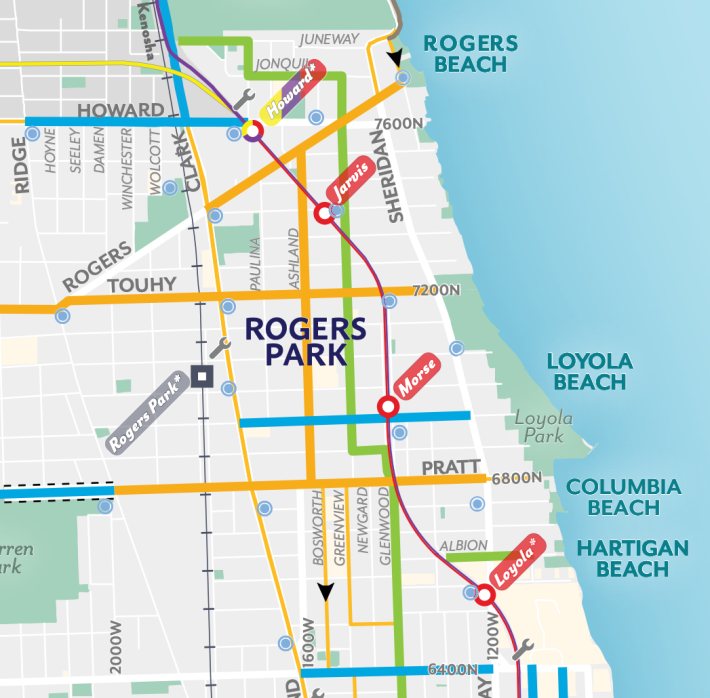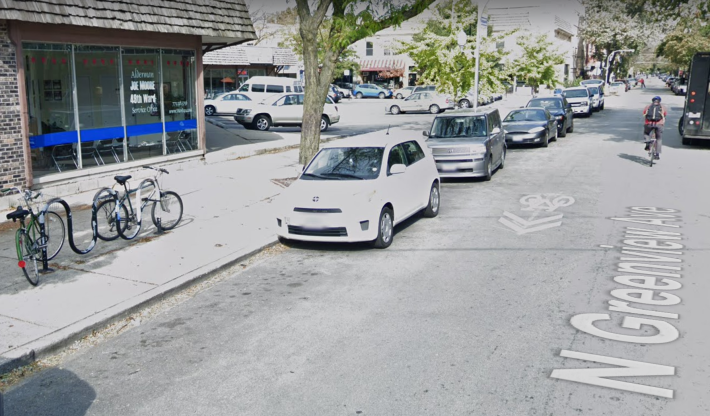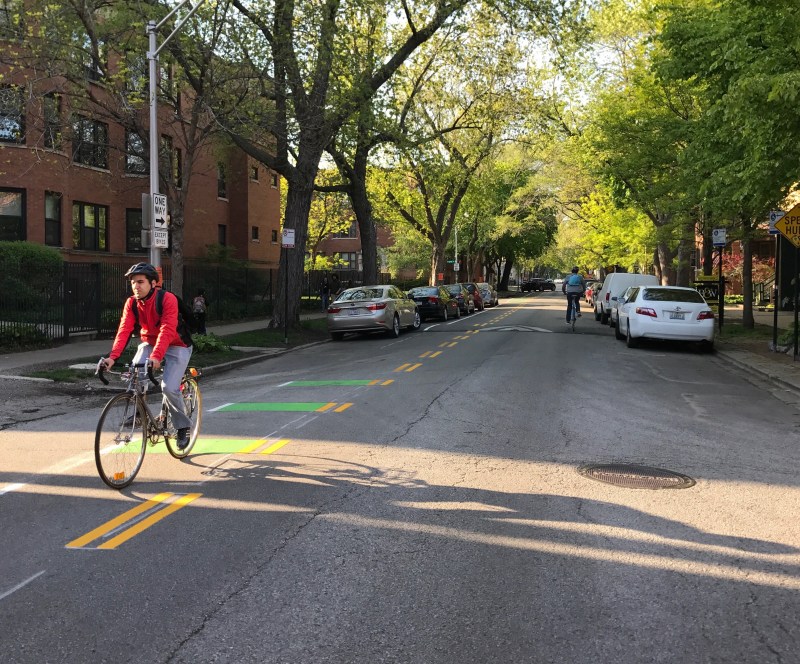Biking in Chicago's Rogers Park, Edgewater, and Uptown community is relatively good compared to many other parts of the city, yet there is still more that can be done to make it better. My own neighborhood of Rogers Park (which is located almost entirely within the 49th Ward) has several miles of bikeways, but only about two miles of conventional bike lanes, and no protected bike lanes at all.
Many people biking through Rogers Park ride along the side-street "neighborhood greenway" route on Glenwood and Greenview Avenues, which runs between Uptown and Evanston. Within Rogers Park the greenway is mostly marked with "sharrows" (bike-and-chevron symbols) with short stretches of contraflow bike lane. I have written about my experiences with harassment from drivers along this stretch and envision a common-sense plan for transforming Glenwood into a truly safe street for cycling.

I met with 49th Ward alderwoman Maria Hadden over the summer to discuss ideas for improving cycling in the neighborhood. I did some research beforehand and learned that the original proposal extending the greenway into Rogers Park included the possibility of fewer stop signs and protected bike lanes. While the route that was built in 2018 was an improvement, including traffic calming features like traffic circles and a raised crosswalk that encourage safer speeds by drivers, the protected lanes were left on the drawing board.
It's time to make this corridor even safer by eliminating vehicular through traffic on these streets altogether. If that idea sounds radical, great! We need bold ideas to bring our biking facilities and streets in general into the 21st century to respond to the climate crisis and create resilient communities. The term "climate resiliency" doesn't just refer to the natural world; it also includes our social, physical, and economic health as a city, region, country, and world. Chicago can be a leader in biking and transit investment if we stop settling for half-measures and act with urgency.
Eliminating vehicular through traffic and some or all of the car parking on Glenwood and Greenview would make the street more people-focused, rather than dedicating most of the space to moving and storing large metal boxes. The street space freed up by this change could make room for mini-parks, seating areas, composting, and secure, sheltered bike parking.
I've traveled Glenwood and Greenwood by car and on bike. When I traveled encased in an automobile I experienced how the street feels narrow to motorists. This helped me understand why drivers traveling in the opposite direction I've encountered while riding in the center of my travel lane on the street have sometimes wanted me to pull farther to the right. Some of them honked, others gave me dirty looks, and some yelled expletives.
What they failed to understand is that I was taking the lane to avoid being doored by people in parked cars. The road is too narrow for people on bike and people in cars to comfortably share the road. My well-being on my bike is very much dependent on the mood of the driver in front or behind me. It is not at all a level playing field.
I'm reminded of the many comments left on my article sharing my experiences with harassment. Many commenters, seemingly drivers, encouraged me to take another route. However, I bike on Glenwood and Greenview because compared to Sheridan Road to the east and Clark Street to the west, it's a relatively chill north-south route. Drivers have many north-south options where they will encounter few people cycling. But people on bikes cannot travel on city streets without dealing with drivers. Again, the playing field is not at all equal.
Continuing to allow drivers free storage of their vehicles on streets subsidizes and encourages driving, and blocks the creation of better uses for our streets. Glenwood and Greenview run parallel to the Red Line and many bus routes. There is great potential to reduce car ownership in the area. While some people, such as those with mobility challenges, a need to transport heavy cargo, or long commutes that aren't practical by transit, may require automobiles, one way we can discourage unnecessary car ownership is through limiting on-street parking.

Ideally, the creation of a nearly car-free bicycle boulevard on Glenwood and Greenwood would happen in tandem with the implementation of bus-only lanes on nearby corridors like Clark and Sheridan, and increased bus, Red Line and Metra UP-North service. By improving transit service and making it easier and safer to bike, we'd give people real alternatives to driving. And by getting more folks on bikes, we'd increase the political support for more car-free or car-lite corridors within the area. East-west routes need to be improved as well.
For people concerned about the reduction of on-street car parking, there are a number of parking garages and we can prioritize the remaining parking spots for folks who truly need them, especially people with mobility challenges.
I'll never forget an interaction I had with a young male driver on Glenwood somewhere between Pratt and Devon, the stretch where I experience the most harassment. I was biking south on Glenwood in the center of my lane when I heard a car approaching from behind. The driver started to honk and I shook my head indicating I wasn't pulling to the right for him. There was no oncoming traffic so he could safely go around me. He passed me, but then slammed on his breaks in front of me, trying to make me crash.
Luckily my reflexes are quick and my brakes were in good order; I was able to avoid harm. But I was left shaken and angry that such conflicts are not being designed out of our city by prioritizing the safety of people on foot and bike. The solutions to mitigating climate change, improving the vitality of our neighborhoods, and giving people real options for getting around are readily available. We just need the political will to make them happen.




